When the "big one" hits — the earthquake that splits freeways, topples buildings and reduces Los Angeles to one massive Lord of the Flies-esque scrum for survival — don't expect anyone to rescue you.
Don't believe us? Let Crisanta Gonzalez, a rep for the L.A.'s Emergency Management Department, tell you. A few weeks after this summer's Ridgecrest earthquakes, she was asked about the aftermath of a major earthquake. Her response blunt: "We're not coming." Not enough police officers. Not enough firefighters. Busted infrastructure. Sorry, kids, you're on your own.
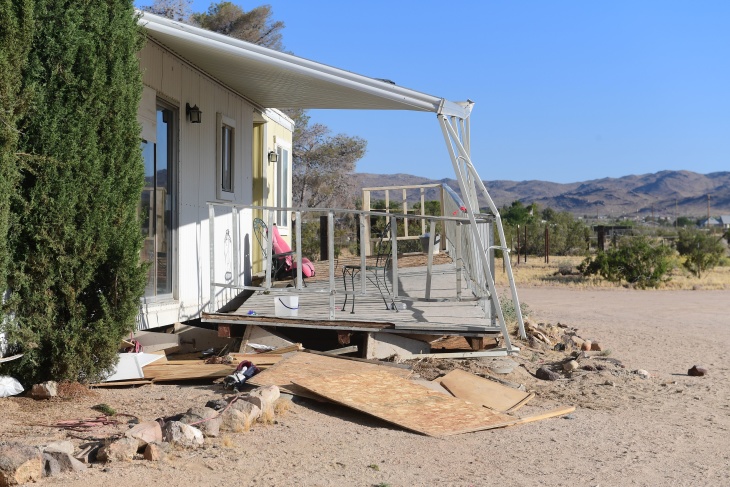
A damaged home is seen after a 6.4-magnitude earthquake in
Ridgecrest, California, on July 4, 2019. (FREDERIC J. BROWN/AFP/Getty
Images)
Maybe you listen to the terrifying yet helpful podcast The Big One. Maybe you dive into the world of "prepperism" and online survivalist communities. Maybe you stockpile water, non-perishable food and first aid supplies (which should also come in handy when climate change forces us to live as goatherds on the Iowa steppes). Maybe you get an invite to an "edible earthquake" dinner and instead of snickering and hitting delete, you RSVP "yes."
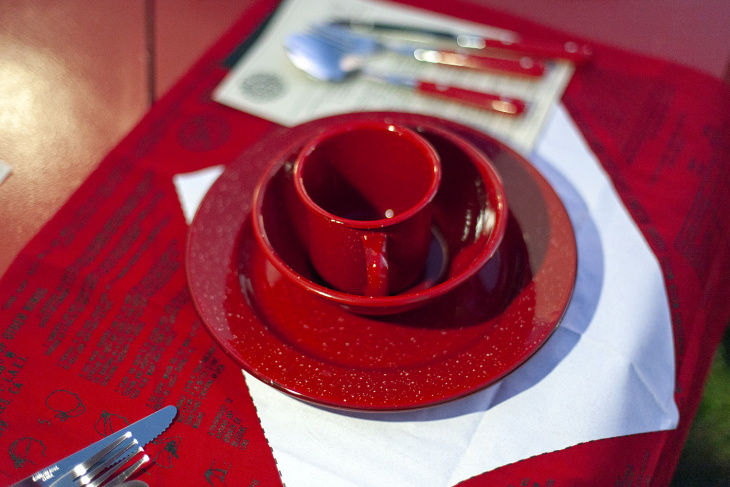
Red enamel dishware at S/H/O/O/K: The Last Survivalist
Supper, held at Barnsdall Park on Oct. 26, 2019. (Photo by Monica
Nouwens, courtesy of City of Los Angeles Department of Cultural Affairs
(DCA) Artwork commissioned by DCA for CURRENT:LA FOOD © [LA Eats Itself ©
2019])
At midnight on Oct. 26, the day of S/H/O/O/K: The Last Survivalist Supper, I received an email with three instructions.
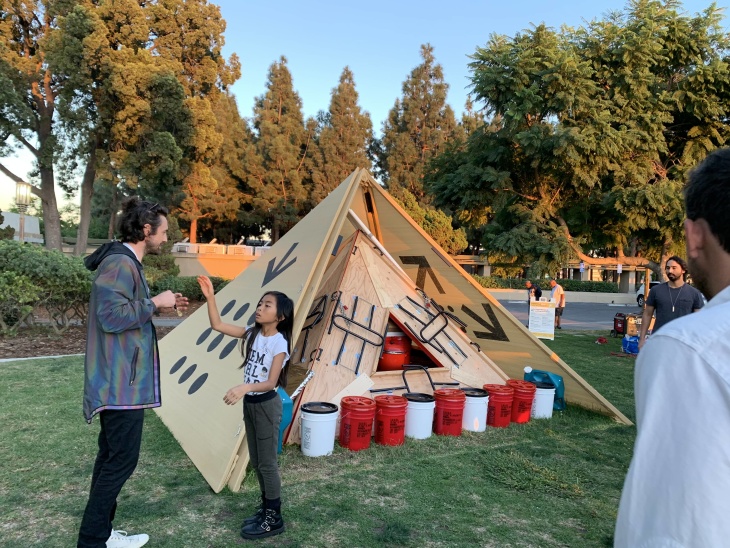
Participants at S/H/O/O/K: The Last Survivalist Supper, held
at Barnsdall Park on Oct. 26, 2019, get ready to assemble their dinner
tables. (Claire Downs for LAist)
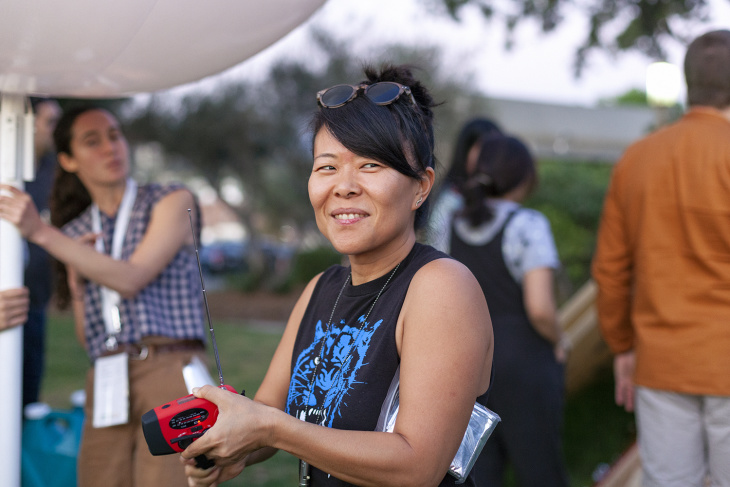
A participant at S/H/O/O/K: The Last Survivalist Supper,
held at Barnsdall Park on Oct. 26, 2019, uses a shortwave radio to help
assemble inflatable emergency beacons. (Photo by Monica Nouwens,
courtesy of City of Los Angeles Department of Cultural Affairs (DCA)
Artwork commissioned by DCA for CURRENT:LA FOOD © [LA Eats Itself ©
2019])
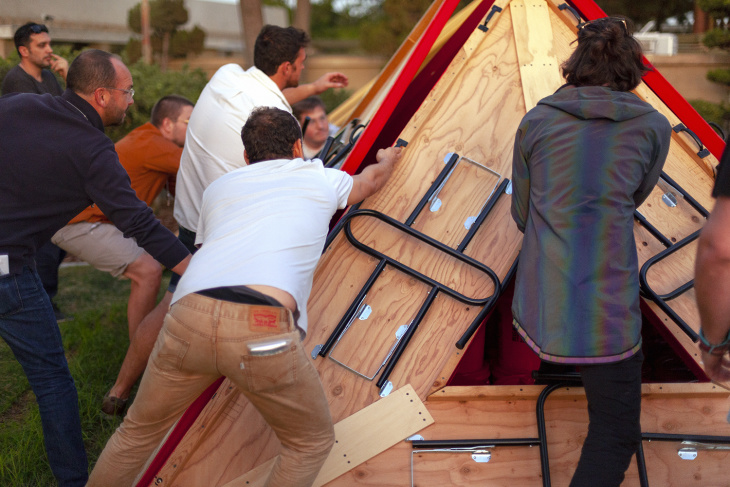
Participants assemble their dinner table at S/H/O/O/K: The
Last Survivalist Supper, held at Barnsdall Park on Oct. 26, 2019. (Photo
by Monica Nouwens, courtesy of City of Los Angeles Department of
Cultural Affairs (DCA) Artwork commissioned by DCA for CURRENT:LA FOOD ©
[LA Eats Itself © 2019])
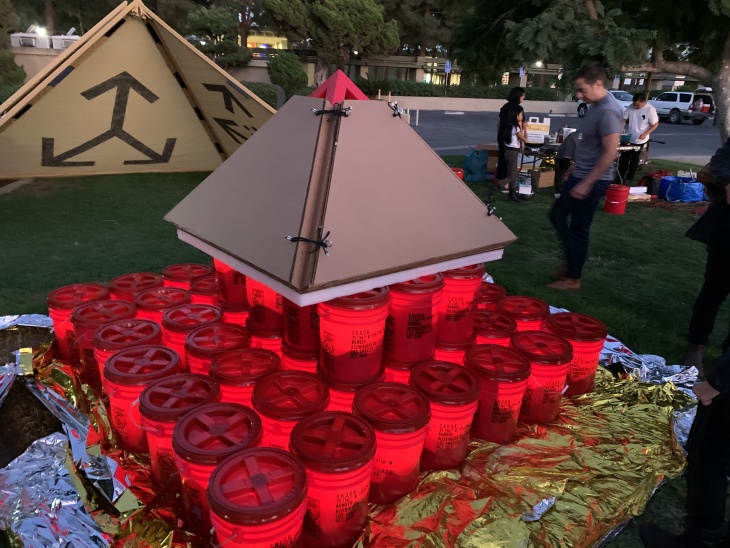
A pyramid of supplies and emergency buckets at S/H/O/O/K:
The Last Survivalist Supper, held at Barnsdall Park on Oct. 26, 2019.
(Claire Downs for LAist)
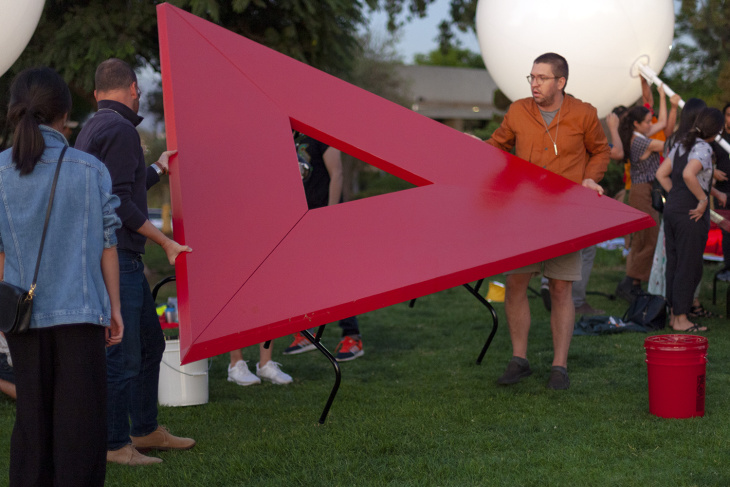
Participants assemble their dinner table at S/H/O/O/K: The
Last Survivalist Supper, held at Barnsdall Park on Oct. 26, 2019. (Photo
by Monica Nouwens, courtesy of City of Los Angeles Department of
Cultural Affairs (DCA) Artwork commissioned by DCA for CURRENT:LA FOOD ©
[LA Eats Itself © 2019])
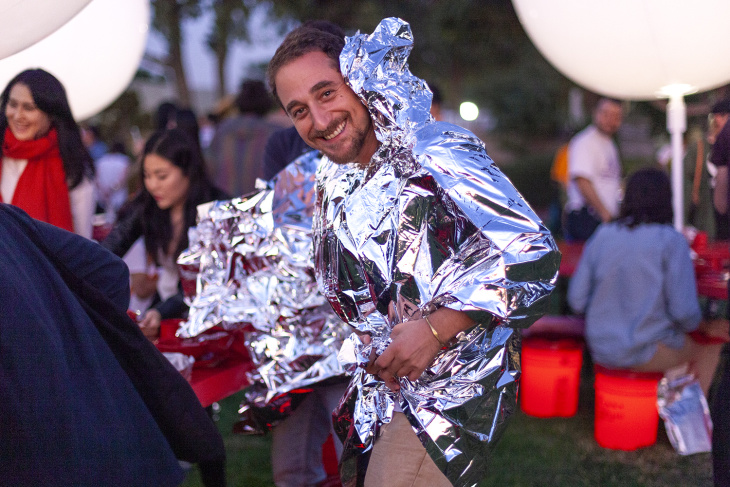
A participant puts on mylar ponchos at S/H/O/O/K: The Last
Survivalist Supper, held at Barnsdall Park on Oct. 26, 2019. (Photo by
Monica Nouwens, courtesy of City of Los Angeles Department of Cultural
Affairs (DCA) Artwork commissioned by DCA for CURRENT:LA FOOD © [LA Eats
Itself © 2019])
The main course required us to do a little more work. My fellow diners and I formed a line and dumped our individual packets of David and Wang's instant pad Thai into a giant pot. After J-Sun stirred it up, we received servings of the communal pad Thai along with packets of peanut butter and tiny Ziploc bags of raw peanuts we could add as garnish.
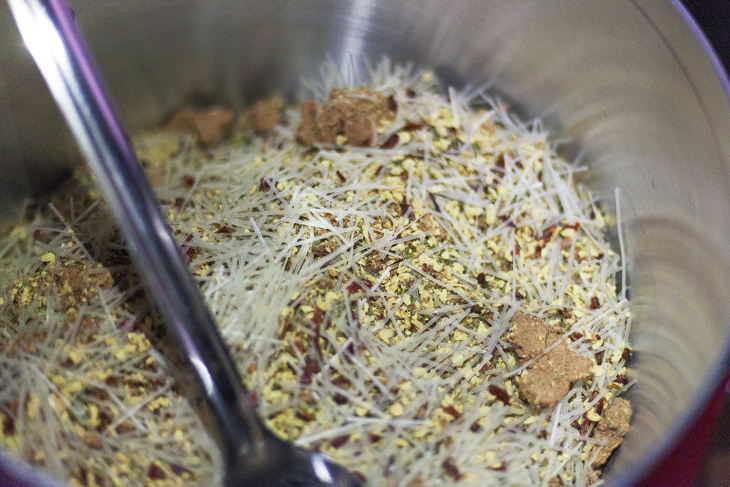
Communal pad Thai served at S/H/O/O/K: The Last Survivalist
Supper, held at Barnsdall Park on Oct. 26, 2019. (Photo by Monica
Nouwens, courtesy of City of Los Angeles Department of Cultural Affairs
(DCA) Artwork commissioned by DCA for CURRENT:LA FOOD © [LA Eats Itself ©
2019])
Between courses, I chatted with a new friend about how brownie dough tastes better on the second and third day. I watched a man show three girls how to create mood lighting with their LEDs. I overheard a Russian immigrant reminisce about his grandmother's fall pickling tradition.
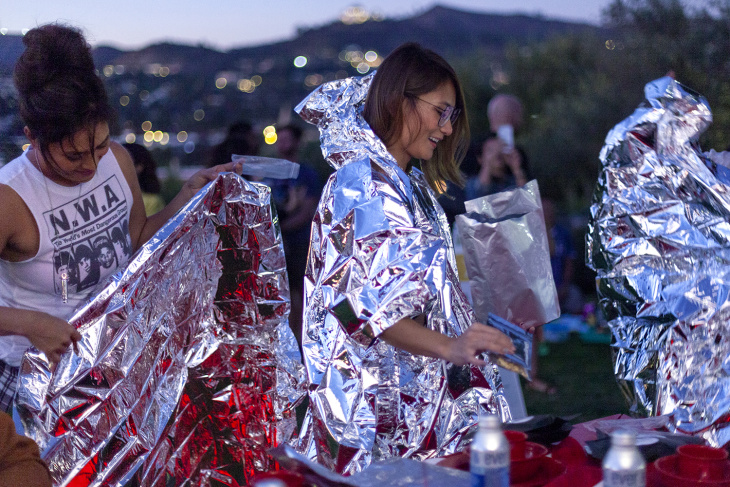
Participants put on mylar ponchos to dine at S/H/O/O/K: The
Last Survivalist Supper, held at Barnsdall Park on Oct. 26, 2019. (Photo
by Monica Nouwens, courtesy of City of Los Angeles Department of
Cultural Affairs (DCA) Artwork commissioned by DCA for CURRENT:LA FOOD ©
[LA Eats Itself © 2019])
Spoken word poetry is best when it's... well, spoken, but his words inspired me to reflect us I crunched around the darkness in my silver poncho, scooping noodles into my mouth with camping flatware. I thought about where I usually am at 4 a.m., in a deep sleep in my East Hollywood motel-style apartment. If there's another earthquake as strong as the one that hit Northridge in 1994 — and eventually there will be — how long would it take for me to react? Would I have time to get to safety? Would any of us? Are we any more prepared for "the big one" than we were 25 years ago? I was filled with anxious visions of natural disasters, past and future.
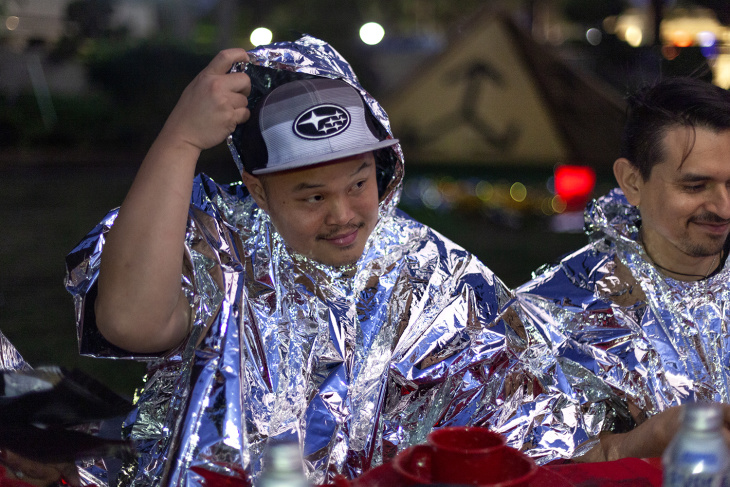
Participants in mylar ponchos dine at S/H/O/O/K: The Last
Survivalist Supper, held at Barnsdall Park on Oct. 26, 2019. (Photo by
Monica Nouwens, courtesy of City of Los Angeles Department of Cultural
Affairs (DCA) Artwork commissioned by DCA for CURRENT:LA FOOD © [LA Eats
Itself © 2019])
Mainstream prepper culture is inherently isolationist. It demands we wall off ourselves (and maybe our loved ones) from the rest of the world in an attempt to survive potential disasters. Earthquakes, fires, floods, nuclear war, societal collapse. Prepperism is also expensive. Need a $100 "fiesta bucket" with "all the fixin's to prepare over 100 delicious Mexican food favorites"? How about a $369 "shield" to protect your home from electromagnetic pulses and solar flares? There are websites waiting to sell them to you. At $89.99, Costco's 23-lb. bucket of mac 'n cheese is a bargain.
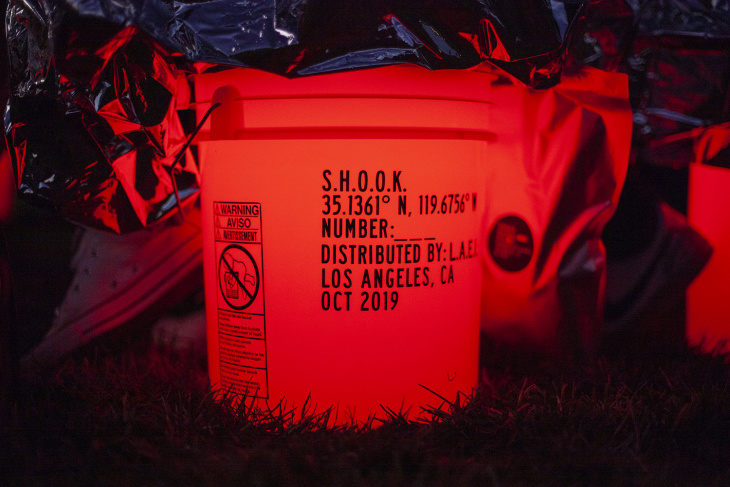
Emergency buckets that also function as chairs at S/H/O/O/K:
The Last Survivalist Supper, held at Barnsdall Park on Oct. 26, 2019.
(Photo by Monica Nouwens, courtesy of City of Los Angeles Department of
Cultural Affairs (DCA) Artwork commissioned by DCA for CURRENT:LA FOOD ©
[LA Eats Itself © 2019])
Later, when I looked at the website for the event, I noticed the meaning of S/H/O/O/K. It stands for "Surviving Humans Of Other Kinds." Making it through a mass disaster isn't just about surviving the initial impact, it's about what we decide to do in the aftermath.
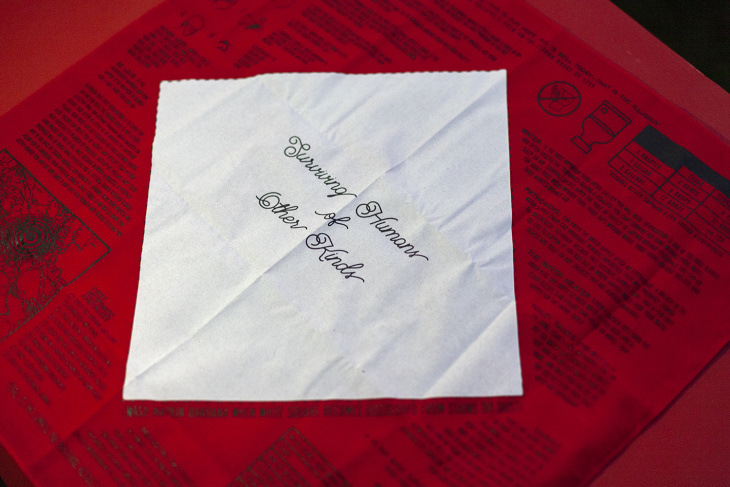
Instructions for S/H/O/O/K: The Last Survivalist Supper,
held at Barnsdall Park on Oct. 26, 2019. (Photo by Monica Nouwens,
courtesy of City of Los Angeles Department of Cultural Affairs (DCA)
Artwork commissioned by DCA for CURRENT:LA FOOD © [LA Eats Itself ©
2019])
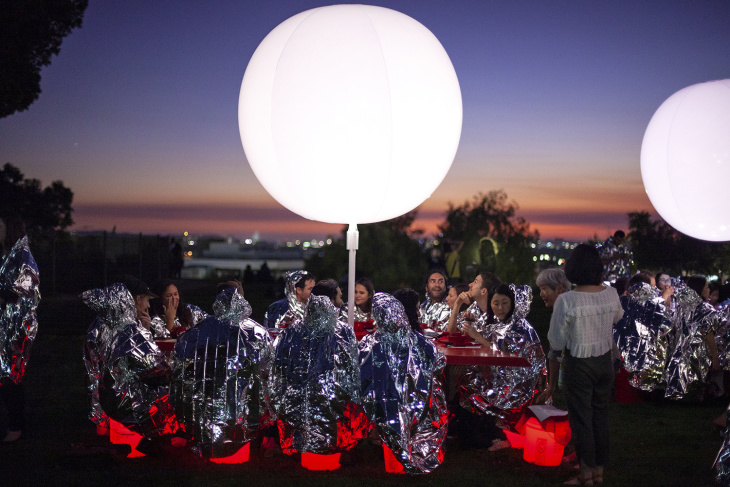
Participants in mylar ponchos dine by the glow of DIY
emergency beacons at S/H/O/O/K: The Last Survivalist Supper, held at
Barnsdall Park on Oct. 26, 2019. (Photo by Monica Nouwens, courtesy of
City of Los Angeles Department of Cultural Affairs (DCA) Artwork
commissioned by DCA for CURRENT:LA FOOD © [LA Eats Itself © 2019])
Current:LA/Food hosts free food and art events around Los Angeles through the end of November. Los Angeles Eats Itself will continue its L.A.-themed series of dinner experiences with a Bling Ring Banquet in mid-2020; the date has yet to be announced. Sign up for their newsletter for more information.
An employee works at the cash register
at Ridgecrest Market, near broken bottles scattered on the floor,
following a 7.1 magnitude earthquake which struck in the area, on July
6, 2019 in Ridgecrest, California. The earthquake, which occurred July
5th, was the second large earthquake to hit the area in two days and the
largest in Southern California in 20 years. (Mario Tama/Getty Images) https://laist.com/2019/11/27/gourmet_earthquake_dinner_big_one_prepperism_natural_disaster_preparedness.php
Don't believe us? Let Crisanta Gonzalez, a rep for the L.A.'s Emergency Management Department, tell you. A few weeks after this summer's Ridgecrest earthquakes, she was asked about the aftermath of a major earthquake. Her response blunt: "We're not coming." Not enough police officers. Not enough firefighters. Busted infrastructure. Sorry, kids, you're on your own.

Maybe you listen to the terrifying yet helpful podcast The Big One. Maybe you dive into the world of "prepperism" and online survivalist communities. Maybe you stockpile water, non-perishable food and first aid supplies (which should also come in handy when climate change forces us to live as goatherds on the Iowa steppes). Maybe you get an invite to an "edible earthquake" dinner and instead of snickering and hitting delete, you RSVP "yes."

At midnight on Oct. 26, the day of S/H/O/O/K: The Last Survivalist Supper, I received an email with three instructions.
- Don't come hangry
- Look for the man with the bucket backpack
- Wear comfy clothes






The main course required us to do a little more work. My fellow diners and I formed a line and dumped our individual packets of David and Wang's instant pad Thai into a giant pot. After J-Sun stirred it up, we received servings of the communal pad Thai along with packets of peanut butter and tiny Ziploc bags of raw peanuts we could add as garnish.

Between courses, I chatted with a new friend about how brownie dough tastes better on the second and third day. I watched a man show three girls how to create mood lighting with their LEDs. I overheard a Russian immigrant reminisce about his grandmother's fall pickling tradition.

Spoken word poetry is best when it's... well, spoken, but his words inspired me to reflect us I crunched around the darkness in my silver poncho, scooping noodles into my mouth with camping flatware. I thought about where I usually am at 4 a.m., in a deep sleep in my East Hollywood motel-style apartment. If there's another earthquake as strong as the one that hit Northridge in 1994 — and eventually there will be — how long would it take for me to react? Would I have time to get to safety? Would any of us? Are we any more prepared for "the big one" than we were 25 years ago? I was filled with anxious visions of natural disasters, past and future.

Mainstream prepper culture is inherently isolationist. It demands we wall off ourselves (and maybe our loved ones) from the rest of the world in an attempt to survive potential disasters. Earthquakes, fires, floods, nuclear war, societal collapse. Prepperism is also expensive. Need a $100 "fiesta bucket" with "all the fixin's to prepare over 100 delicious Mexican food favorites"? How about a $369 "shield" to protect your home from electromagnetic pulses and solar flares? There are websites waiting to sell them to you. At $89.99, Costco's 23-lb. bucket of mac 'n cheese is a bargain.

Later, when I looked at the website for the event, I noticed the meaning of S/H/O/O/K. It stands for "Surviving Humans Of Other Kinds." Making it through a mass disaster isn't just about surviving the initial impact, it's about what we decide to do in the aftermath.


Current:LA/Food hosts free food and art events around Los Angeles through the end of November. Los Angeles Eats Itself will continue its L.A.-themed series of dinner experiences with a Bling Ring Banquet in mid-2020; the date has yet to be announced. Sign up for their newsletter for more information.

No comments :
Post a Comment